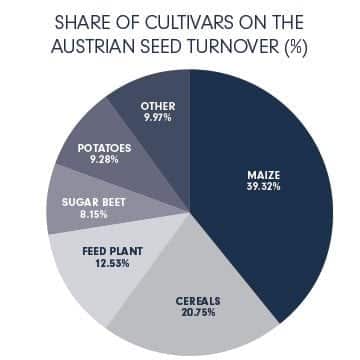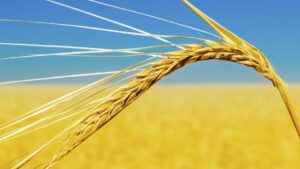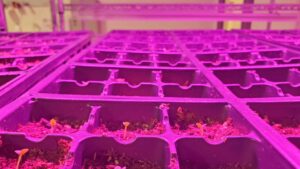Though the country may be small, Austria’s seed industry is ready to do business with the world.
Austria has 7.4 million hectares of agricultural land and forests. The latter accounts for more than 46 per cent of this area. The agricultural land consists of 1.4 million hectares of arable land and 1.3 million hectares of permanent grassland. Grassland can mainly be found in the western part of the country and the mountainous regions, while arable land is located in the eastern part of Austria.
Crops grown on arable land:
• 822,000 hectares of cereals and maize
• 215,000 hectares of oils and protein crops
• 72,000 hectares of sugar beets and potatoes
• 242,000 hectares of fodder crops
• Residual area different crops
• 15,000 hectares of fruits and 45,000 hectares of grapevine
The structure of farms is generally small. To illustrate this, 95 per cent of all farms run less than 100 hectares of agricultural land and forest. Even 70 per cent of them run less than 30 hectares. However, the size of the farms increases continuously.
The seed multiplication area varies between 35,000 and 37,000 hectares. The main crops in this sector are cereals, maize, soybean, potatoes and sugar beet. Small amounts of production are done in different oil and protein crops, fodder crops and vegetables.
Most seed production in Austria is done by 12 companies including national cooperatives, national private companies, as well as branches of international companies, represented by Saatgut Austria— Austria’s national seed association. There are also some companies who just trade with seeds but do not produce them on their own. Breeding and seed production, especially of plant genetic resources, is also done by farmers and associations not included in Saatgut Austria, whose full name is Vereinigung der Pflanzenzüchter und Saatgutkaufleute Österreichs (VPSÖ).
In Austria there are still eight companies working on plant breeding. Although the focus lies on cereals — especially on wheat — maize, potatoes, soybean, vegetables and some other local crops like oilseed pumpkins are also bred.
Since the Austrian market is very small, most plant breeders and seed companies are also present in the east and southeastern European countries.
Saatgut Austria
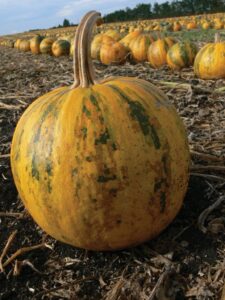
The Austrian Plant Breeders’ Association has existed for more than 65 years. The exact date of its founding is unknown. An association of Austrian seed merchants also existed in previous years.
In 2000, these associations decided to merge to form Saatgut Austria.
Saatgut Austria has an executive committee with a chairman, who represents the association. The secretary is responsible for internal coordination, organisation and the budget.
The membership of Saatgut Austria is made up 30 companies working in plant breeding and/or the seed production and trade. Other members include 12 private persons, including employees of seed companies and also members of the University and Ministry of Agriculture.
Saatgut Austria also has working groups, who discuss topics that are only relevant for certain members: e.g. plant variety protection and farm-saved seed, seed treatments, cereals, maize, forage crops and grasses, public relations, etc.
The general assembly meets once a year. The executive board and the working groups meet more often, if required. Saatgut Austria is an association with a democratic structure. Although companies with different structures and interests are members, democratic decisions are respected by all after sufficient discussion.
At the international level, Saatgut Austria is a member of the European Seed Association and the International Seed Federation. The chairman and some members of the executive board are also working in different sections of ESA and ISF. Some members, who are cooperatives, are also in invoved with the Committee of Professional Agricultural Organisations (COPA-COGECA). Within this framework, there is also contact with other national seed associations.
Discussion, Coordination and Promotion
The goal of Saatgut Austria is to discuss, coordinate and promote the interests of Austrian plant breeders and seed producers. These goals are achieved through presentations, discussions, and meetings combined with membership subscriptions, donations, and proceeds from projects and conferences.
At the national level, Saatgut Austria has a very good relationship with the Austrian agricultural authority and parts of the government. Saatgut Austria is an acknowledged stakeholder and is given a chance to discuss laws and other regulations before they are passed.
The Role of Saatgut Austria
Since Saatgut Austria members do not generally belong to international associations, the association is their direct connection to the European Seed Association and International Seed Federation.
Bringing together plant breeders and seed producers, especially getting them in contact with the government and the authorities, is one of the main roles of Saatgut Austria. The association functions as a coordinator of research projects between plant breeding companies and research institutions. It also lobbies for the use of certified seed.
The most important topics within Saatgut Austria are arguing for a good farm-saved seed regulation and presenting professional plant breeding and seed production to the general public.
Major Successes and Challenges
As mentioned, the size of Austrian farms is quite small. As a consequence, the coexistence of GMOs and GMO-free plants would be very difficult and expensive to regulate. Therefore, Saatgut Austria supported a regulation concerning contamination of non-GMO seed with GMO seed. Since 2001, Austria is the only country in Europe with a legal regulation concerning low-level presence. Although the threshold value is zero in a first testing of a defined sample and the seed industry has to pay for analysis, legal measures can be taken if a minimal contamination is found later on.
Since this regulation was introduced, Austrian maize seed production increased by fivefold in the area. A big part of the produced seed is exported to regions where GMO-free seed is important. Austria is known as a reliable partner in this area. In addition, the seed production of soybeans has increased similarly. A breeding program for non-GMO soybeans has even been established in Austria in recent years.
The main challenge Saatgut Austria faces is to maintain regionally adapted plant breeding both for the Austrian market and export. As the home market is not large enough in order to work cost-effictively, export is essential. Therefore, Saatgut Austria advocates for a farm-saved seed regulation in Austria and at the same time, encourages the breeding varieties that are competitive in various regions.
Currently, it is difficult to get seed treatment products registered for export due to political consequences of the neonicotinoid restrictions in effect in the EU. This puts Austria at a disadvantage compared to neighbouring countries.
Saatgut Austria Executive Committee
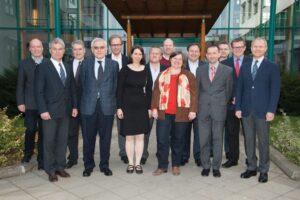
Chairman: Michael Gohn
Chairmen Deputy: Johann Blaimauer, Johann Birschitzky, Erich Schwarzenberger
Members Of The Executive Board: Erwin Arocker, Felix Fuchs, Josef Fraundorfer, Johann Posch, Andreas Ziegler, Elisabeth Zechner, Rainer Frank, Paul Brunner, Hubert Kabinger, Hermann Tappler, Christian Stockmar
Auditors: Peter Nachtnebel,
Walter Steinmayr
Secretary: Anton Brandstetter
Farm-Saved Seed in Austria
The European Union regulation 2100/94 functions as the base of the Austrian law on plant variety rights from 2001. In respect to the use of farm-saved seed (FSS), the Austrian law makes no further clarification on royalties and their collection. The law provides the possibility for agreements between farmers and breeders. However, small farmers are excluded from any farm-saved seed regulation.
The Minister for Agriculture can promulgate a regulation with regard to information on the use of FSS when an agreement between the stakeholders exists. However, until recently, it was not possible to achieve such an agreement with the farmer legal representation (Chamber of Agriculture). During VPSÖ’s regular discussions with the Chamber of Farmers, it became apparent that the participants agree on the arguments, but cannot admit this officially because of political reasons. Due to these reasons, such agreements could not be achieved until the present day. Furthermore, the government and the minister gave VPSÖ to understand that this is the precondition for them to intervene/act.
Since the structure of the farms is very small, many of them would not be covered by FSS regulation.
Join Us at the ESA Annual Meeting In Vienna
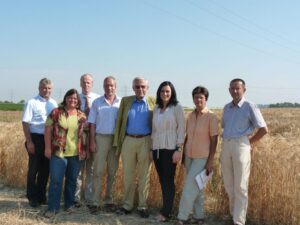
Hosting the ESA Annual Meeting is important for Saatgut Austria and its members. The organisation looks forward to networking with other experts in the seed industry. It is also a great opportunity to present the Austrian plant breeders and seed production industries to journalists — it’s always important to share information on agricultural matters with non-experts.
Registration for the ESA Annual Meeting is open. Register now!



